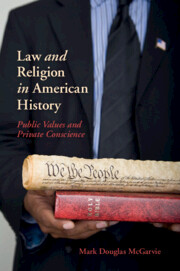Book contents
- Frontmatter
- Contents
- List of Illustrations
- Preface
- Acknowledgments
- Prologue: Colonial America Perpetuates State Religion
- 1 Revolution in Thought and Social Organization: The Legal Hegemony of Jeffersonian Liberalism, 1776–1828
- 2 A Christian Counter-revolution and a New Vision of American Society, 1828–1865
- 3 Regulating Behavior and Teaching Morals: The Uses of Religion, 1865–1937
- 4 The Rights Revolution, 1937–2015
- Epilogue: The Signifi cance of History and a Reconsideration of Original Intent
- Bibliographic Essay
- Index
3 - Regulating Behavior and Teaching Morals: The Uses of Religion, 1865–1937
Published online by Cambridge University Press: 05 July 2016
- Frontmatter
- Contents
- List of Illustrations
- Preface
- Acknowledgments
- Prologue: Colonial America Perpetuates State Religion
- 1 Revolution in Thought and Social Organization: The Legal Hegemony of Jeffersonian Liberalism, 1776–1828
- 2 A Christian Counter-revolution and a New Vision of American Society, 1828–1865
- 3 Regulating Behavior and Teaching Morals: The Uses of Religion, 1865–1937
- 4 The Rights Revolution, 1937–2015
- Epilogue: The Signifi cance of History and a Reconsideration of Original Intent
- Bibliographic Essay
- Index
Summary
The Second Awakening, the communitarian social initiatives of the Benevolent Empire, and the invocation of a civil religion by President Lincoln helped erode the nation's secular orientation and the clarity of disestablishment by the end of the Civil War. Yet, the laws in 1865 continued to assert the separation of church and state, even if many court decisions, public policies, and attitudes seemed to reject the doctrine. Separation continued largely because of the early republic's legal delineation of public and private spheres. While challenged from the 1830s onward, this legal delineation did not confront serious reconsideration until the late 1800s and early 1900s. Then the politicization of morality by both non-Christian Pragmatists and Christian reformers in pursuit of new conceptions of social justice demanded a form of legal positivism that rendered the classical liberal demarcation of government authority to a circumscribed public sphere an archaic impediment to social progress. These reformers not only reintroduced religion as a basis for moral action into political discourse, but also minimized the legal basis for the separation of church and state.
Postwar society created a fertile ground for reconsideration of the nation's purpose and values. The Civil War produced tremendous doubt among Americans that they were either God's chosen people or capable of democracy. Simultaneously, America experienced a transformation from a local to a national culture. Initially, this national culture expressed longings for a new sense of community rooted in discipline and traditional values. The anguish of the War defeated ideas of anti-institutional individualism, such as Thoreau's embrace of civil disobedience. However, by the 1880s, Americans were open to revising their values and looked to a new educated class of professionals and experts in pursuing efficiency, predictability, and conformity. The rigorous social code imposed in Victorian America can be seen as rooted in this culturally derived value system combined with Christian ethical prescriptions. It offered predictability and an appreciation of conformity in an era of tremendous social change and the anxiety it produced. Americans expected their institutional authorities to protect and encourage the new social code.
As law and religion form the two greatest institutional authorities in the United States, they were asked, singularly and together, to lead Americans’ adaptation to a new society – at once protecting the values and lifestyles of the past while enabling people to prosper in a new social context.
- Type
- Chapter
- Information
- Law and Religion in American HistoryPublic Values and Private Conscience, pp. 81 - 126Publisher: Cambridge University PressPrint publication year: 2016



